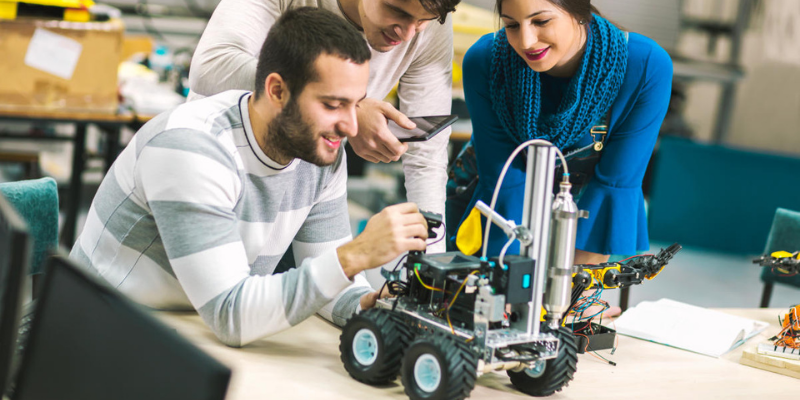
World crises can be devastating. They can affect lives and reshape economies. Yet, they can also create unexpected career opportunities.
As we navigate disruptions like climate change, cyber threats, and global health emergencies, demand grows for professionals who can adapt and innovate.
So, let’s look at six careers that are turning crisis into opportunity this year.
Robotics Engineer
In July 2024, the traditionally dry Sahel-Saharan strip experienced unprecedented rainfall, with some areas recording 600% above average. The floods caused over 1,000 deaths and displaced 3 million people, including significant numbers in Niger and northern Nigeria.
Infrastructure damage was extensive and crops and homes were devastated.
Such disasters are sadly becoming ever more frequent. So, they highlight the need for modern technologies like robotic assistance in relief efforts.
Robotics engineers focus on developing machines that can navigate hazardous environments to support recovery operations.
Core functions include:
- Designing robots capable of delivering supplies to inaccessible areas.
- Creating automated systems for infrastructure assessment post-disaster.
- Deploying search-and-rescue drones equipped with advanced sensors.
These engineers help enhance response efficiency by integrating technology into disaster management strategies.
Their work aids rapid recovery while minimizing risks to human responders.
Supply Chain Resilience Strategist
Supply chains face constant pressure from current global disruptions, such as hurricanes and wars.
Enter the supply chain resilience strategist, a role that is emerging as businesses navigate unprecedented challenges.
These strategists focus on enhancing flexibility and robustness within supply networks, turning crisis into opportunities.
Key responsibilities include:
- Assessing risks in supply chain operations to identify vulnerabilities.
- Developing contingency plans that ensure continuity during disruptions.
- Implementing technologies like blockchain for transparent tracking of goods.
- Collaborating with suppliers to strengthen partnerships and reduce reliance on single sources.
Basically, these professionals help organizations mitigate risk while optimizing performance, proving essential amid economic uncertainties.
With their strategic insight, businesses can adapt quickly to changing conditions and maintain competitiveness in an unpredictable world landscape.
Incident Response Specialist in Cybersecurity
In July 2024, CrowdStrike released a faulty update to its Falcon Sensor security software. This caused widespread issues with Microsoft Windows computers running the software, leading to massive IT outages.
Incident response specialists were vital in resolving these disruptions efficiently, ensuring continuity of business operations amid such challenges.
Incident response specialists play a crucial role in quickly addressing and mitigating cyber threats. Their expertise helps organizations minimize damage and recover swiftly from security incidents.
Key responsibilities include:
- Identifying potential threats by monitoring network activity for suspicious behavior.
- Developing comprehensive incident response plans tailored to organizational needs.
- Coordinating with IT teams to remediate vulnerabilities and restore affected systems.
- Conducting post-incident analyses to improve future defenses.
Climate Adaptation Specialist
The ongoing climate crisis, with its frequent extreme weather events and rising sea levels, demands urgent adaptation strategies. Enter the climate adaptation specialist—a role dedicated to helping communities and industries adjust to environmental changes.
In this role, key responsibilities include:
- Assessing vulnerabilities in infrastructure and ecosystems due to changing climates.
- Developing sustainable plans for urban planning, agriculture, or coastal management.
- Collaborating with governments and NGOs on policy creation and implementation.
These specialists work across sectors to build resilience against climatic impacts. For instance, they might devise flood prevention systems for cities prone to heavy rainfall or propose agricultural shifts towards drought-resistant crops.
Their expertise enables societies not just to endure but thrive amidst climate-related challenges by proactively transforming vulnerabilities into strengths through strategic adaptations.
Cosmetologist
The environmental crisis is reshaping the world of cosmetology by pushing for greener alternatives.
Consumers increasingly demand eco-friendly products as awareness grows around climate change and ecological impacts. This trend propels the beauty industry towards sustainable practices like ethical sourcing, reducing waste, and using biodegradable materials.
Such changes open doors for beauty professionals adept at adapting to green standards.
This shift doesn’t just meet consumer demands; it revitalizes career paths within cosmetology by encouraging innovation and creativity in developing new products and techniques that align with sustainable values.
Cosmetologists embracing these practices turn a global challenge into an opportunity for growth and success.
In many regions, there is a growing need for professionals in the sector of beauty services and treatments. For example, cosmetology jobs in Arizona are in high demand.
AI Ethics Officer
Artificial intelligence ethics officers are becoming essential in guiding organizations through the responsible development and deployment of artificial intelligence technologies. They ensure ethical principles guide innovation, protecting users and society from potential harms.
Core duties include:
- Establishing guidelines to embed ethical standards in AI projects.
- Monitoring AI applications for compliance with these principles.
- Educating teams on responsible AI practices.
While we’re not yet quite at crisis point, researchers at the University of Oxford recently highlighted a critical need for ethics integration, particularly regarding children.
Their findings showed that while AI helps protect kids by flagging inappropriate content, it often lacks safeguarding measures in its design, especially within Large Language Models.
Without this focus, children might encounter biased or harmful content online due to factors like ethnicity. Addressing these gaps is crucial for fostering safe digital environments.
The Takeaway
As we have seen, amidst global crises, new career opportunities emerge. As the world faces environmental shifts, technological advancements, and societal upheavals, these roles become increasingly vital.
Embracing the above career paths empowers individuals to make impactful contributions, turning global challenges into opportunities for innovation and positive change in society.










